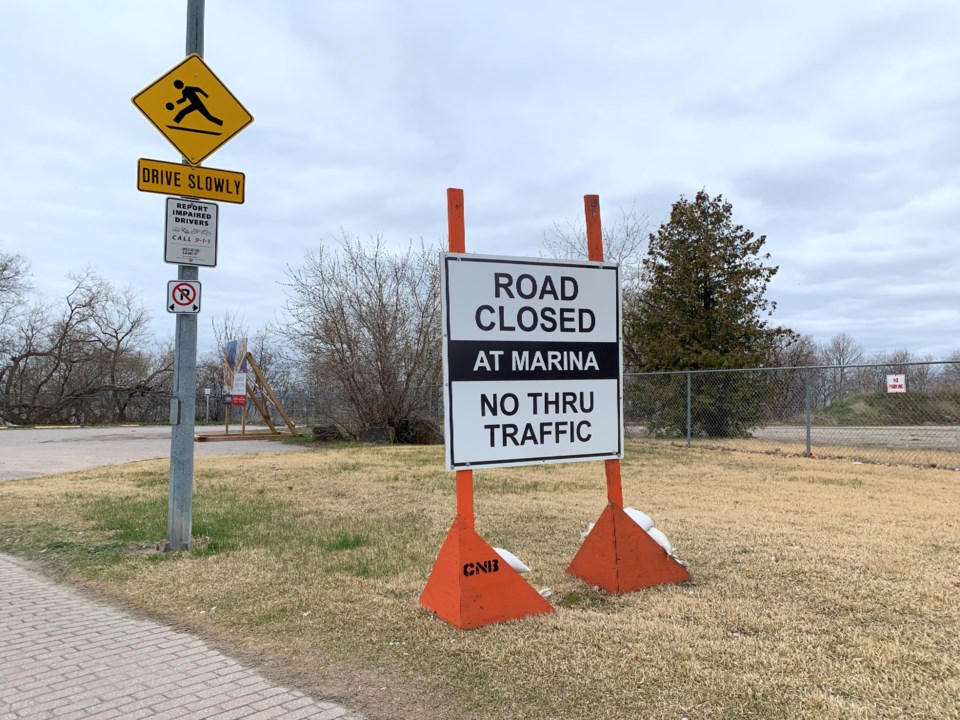Call it an active transportation appetizer.
According to Mayor Al McDonald, the City of North Bay's decision to close a section of Memorial Drive to vehicular traffic over the Victoria Day weekend, "to give everyone much needed extra space to strengthen their mental and physical health, while following all the COVID-19 protocols," was such a success, the powers-that-be will do it again this weekend.
See related story: Memorial Drive closed again this weekend
"We would love to hear from you, if you used the waterfront and what your thoughts were on the extra space on the long weekend," McDonald posted in a Facebook COVID-19 update.
The City of North Bay was not the only interested observer when it came to the Memorial Drive closure.
Rod Bilz is involved in various active transportation advocacy groups, including the Discovery Routes Trails Organization and Active Transportation North Bay, while he leads Cycling Advocates of Nipissing. Bilz feels there is a future for expanded active transportation involvement in North Bay.
"I do think there is definitely an opportunity. If it does nothing other than just introduce the idea to the community that we can close roads and the end of the world is not going to happen."
What about extending the Memorial Drive closures to summer weekends, or even, all summer?
"I think there would be a little bit of backlash, at this point. To create a community space that people want to spend time in, there have to be a bunch of services or things that are going on to attract people there," says Bilz.
He feels any move to make Memorial Drive pedestrian-only will depend on the direction the future development of the waterfront takes.
"Right now, people have cabin fever and they're looking for an outlet," says Bilz. "Without having some sort of events or restaurants or other facilities within that area, it's tough to keep pedestrians motivated to continue to use that when there is nothing else there other than the waterfront."
Active Transportation committee member and North Bay City Councillor Marcus Tignanelli was one of a group of volunteers who aided in the collection of data over the long weekend.
The volunteers tracked the number of pedestrians and cyclists across a common point on Memorial Drive within the area closed to vehicular traffic. The active transportation group shared its findings online, collected from 15 per cent or nine of the 60 daylight hours of activity (or about 15 hours per day) over the long weekend when Memorial Drive was closed to traffic.
Tignanelli says, "I think the waterfront should be paramount to active transportation and pedestrians and people using it for recreation first — and traffic second."
"From what I am hearing, the closure to traffic on Memorial was very well received and appreciated. It didn't cause any traffic concerns (in fact drivers used McIntyre and Oak as designed which brought more traffic through downtown core). Parking lots and the marina boat launch were open for public use," posted McDonald following the long weekend. "Families and couples used the extra space at the waterfront to strengthen the mental/ physical health."
There was some confusion about marina access by vehicles the first weekend but recent communications from the City have cleared up that point.
"All necessary traffic we allow in," advises Tignanelli. "You have access to the marina, you have access to the businesses, and you have access to the wastewater treatment plant by vehicle."
Says Bilz, "It really comes down to changing the thought process. We're trying to get people thinking on a smaller scale, where things are closer together, that you can walk to or bike to."
Tignanelli says the pandemic — and resulting physical distancing requirements — has created this unique opportunity for active transportation study in the near and long term.
As far as continuing to close a portion of Memorial Drive on summer weekends, Tignanelli says, "As long as the feedback is good. We're hearing from people that's what they want. We have hundreds of messages of support for it. As long as the support is there for it — if it dwindled we wouldn't be doing it. Once the social distancing rules are relaxed, we will have to re-evaluate it and measure the data we have to see how much people are using it."
